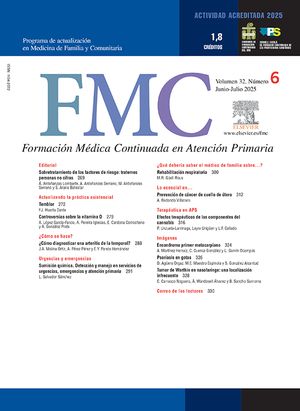FMC es un programa de actualización escrito por y para el especialista en medicina familiar y comunitaria y el conjunto de los colectivos profesionales de la atención primaria de salud. Su principal objetivo es ofrecer elementos e instrumentos de formación e información orientados a la solución de los problemas reales a los que se enfrentan estos profesionales y a mejorar sus habilidades.
Últimos contenidos
Vértigo y otros trastornos del equilibrio
El vértigo, definido como una ilusión de movimiento del entorno o del propio cuerpo, originado por la asimetría del sistema vestibular, es un síntoma frecuente, que afecta significativamente a la calidad de vida de las personas. La prevalencia del vértigo a nivel mundial varía según la población estudiada y las definiciones utilizadas. Se estima que, a lo largo de la vida en adultos de 18 a 79 años, es del 7,4%; la prevalencia a 1 año, del 4,9%, y la incidencia a 1 año, del 1,4%, aunque se observa una marcada preponderancia femenina entre los individuos con vértigo.
Más informaciónOrganización de la atención a personas residentes en centros sociosanitarios
La planificación de los cuidados de las personas dependientes es un reto de primer orden para las sociedades democráticas. Los médicos de familia y los profesionales de enfermería en atención primaria deben tener un conocimiento sólido de la organización de los cuidados en este ámbito; con frecuencia creciente son los responsables directos de la atención de las personas residentes en estas instituciones.
La Ley de Dependencia es el fundamento sobre el cual se deben garantizar la atención y los derechos de las personas con dependencia. Los modelos organizativos y de gestión sociosanitaria son muy diversos. El enfoque de atención debe tender, sobre todo, a la personalización y la mejora continua de la calidad de provisión de los servicios.
Último sumario
Volumen 32. Número 6 (Junio 2025)

Editorial
-
- Sobretratamiento de los factores de riesgo: tratemos personas no cifras
- Ángel Antoñanzas Lombarte, Alma Antoñanzas Serrano, Mar Antoñanzas Serrano, Santi Arana Ballestar
- FMC. 2025;32:269-71
-
Actualizando la práctica asistencial
-
- Temblor
- Francisco Javier Huerta Dante
- FMC. 2025;32:272-8
-
- Controversias sobre la vitamina D
- Alberto López García-Fanco, Ana Pereira Iglesias, Elena Cardona Corrochano, Anabel González Prats
- FMC. 2025;32:279-87
-
¿Cómo se hace?
-
- ¿Cómo diagnosticar una arteritis de la temporal?
- Juan Armando Molina Ortiz, Ainhoa Pérez Pérez, Emilio Yaser Pando Hernández
- FMC. 2025;32:288-90
-
Urgencias y Emergencias
-
- Sumisión química. Detección y manejo en servicios de urgencias, emergencias y atención primaria
- Lydia Salvador Sánchez
- FMC. 2025;32:291-9
-
¿Qué debería saber el médico de familia sobre...?
-
- Rehabilitación respiratoria
- María Rosa Güell Rous
- FMC. 2025;32:300-11
-
Lo esencial en...
-
- Prevención de cáncer de cuello de útero
- Ana Redondo Villatoro
- FMC. 2025;32:312-5
-
Terapéutica en APS
-
- Efectos terapéuticos de los componentes del cannabis
- Paula Unzueta-Larrinaga, Leyre Urigüen, Luis F. Callado
- FMC. 2025;32:316-23
-
Imágenes
-
- Encondroma primer metacarpiano
- Andrés Martínez Herraiz, Concepción Cuenca González, Lucía Garvín Ocampos
- FMC. 2025;32:324-5
-
- Psoriasis en gotas
- David Agüero Orgaz, María Elena Maestro Espínola, Silvia González Alcantud
- FMC. 2025;32:326-7
-
- Tumor de Warthin en nasofaringe: una localización infrecuente
- Celia Carrasco Noguero, Álvaro Wandosell Álvarez, Blanca Sancho Sanroma
- FMC. 2025;32:328-9
-
Correo de los lectores
-
- Riñones supranumerarios, ¿tres son multitud?
- Juan Armando Molina Ortiz
- FMC. 2025;32:330-1
-

Suscríbase a FMC
- El programa se articula alrededor de la revista (mensual, 10 números al año), con diversas secciones, algunas presentes en todos los números y otras esporádicas. Además incluye las guías para la práctica asistencial y comunitaria (2-3 nuevas guías anuales), dos cursos FMC anuales y los cuestionarios mensuales de autoevaluación.
- Con la finalidad de incrementar la oferta formativa a los suscriptores y lectores, podrán reacreditarse los cursos o guías para la práctica asistencial previamente publicados por el Programa FMC que por su calidad y vigencia continúen manteniendo intacto su interés formativo.
- FMC acredita el esfuerzo de los suscriptores ofreciendo más de 100 horas anuales de acreditación (CCFCPS)
- Disponibles diferentes modalidades de suscripción.


